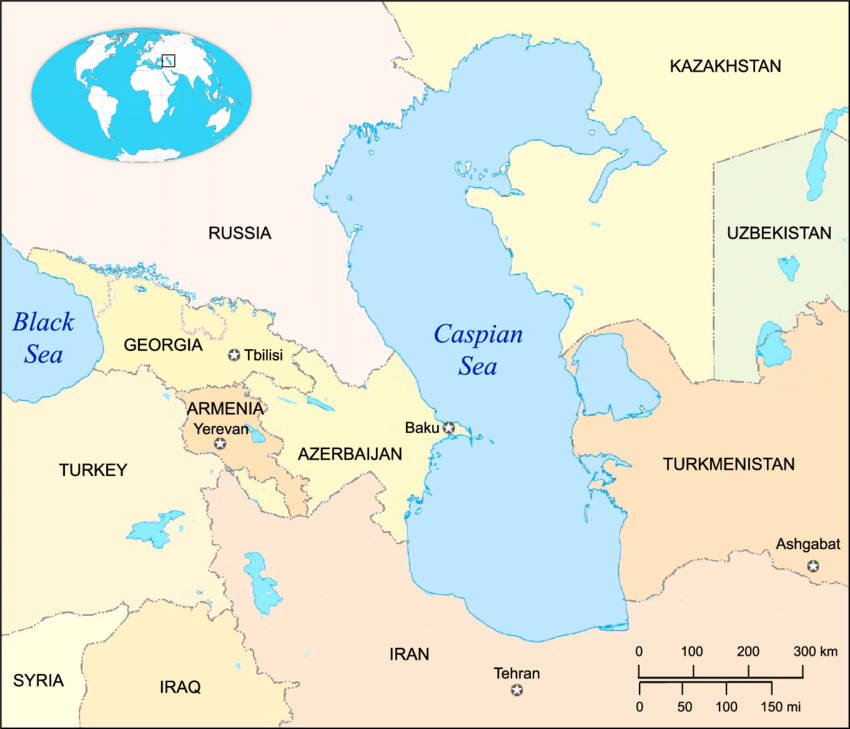Regional Trade & Development Strategy Highlights From The Second Caspian Sea Forum
The Caspian Sea has a vital strategic position in Eurasia, supplying 20% of global oil and 26% of global gas supplies
By Chris Devonshire-Ellis
Moscow has been hosting the second Caspian Economic Forum in Moscow from 5 to 6 October, being an important platform for discussing cooperation between the countries of the Caspian region. These include Russia as well as Kazakhstan, Turkmenistan, Iran and Azerbaijan. The Caspian has become increasingly important as it develops two main transport corridors heading east from Europe and Turkiye. This includes the two “Middle Corridors”, which extend from Baku Port in Azerbaijan across to either Kazakhstan’s Aqtau Port, and onto China, and from Baku to Turkmenbashi Port and across to Uzbekistan and Central Asia.
The Caspian is also a focal point of the INSTC, which bisects Iran from its Caspian Ports and heads south by road and rail to its Persian Gulf Ports and onto markets in East Africa, the Middle East, India and South Asia.
The two-day forum was attended by over a thousand delegates and not only from the Caspian countries, but also from Belarus, China, Kyrgyzstan and Uzbekistan.

Russia’s Prime Minister Mikhail Mishustin gave a speech at the CEF plenary session describing the current state of cooperation in the Caspian region. We translate and reproduce this as follows:
“For Russia, the Caspian Sea is of great importance, primarily taking into account its strategic position in the center of Eurasia, at the intersection of transport and energy arteries, as well as mineral wealth and unique biological resources. The Caspian countries may have different interests, but they are able to find mutually beneficial solutions in dialogue.
Trade Performance
Over the past 20 years, the total gross domestic product has almost tripled, and mutual trade has increased fivefold. Over the past five years, the share of Caspian countries in world GDP has grown to 3.6%, and mutual trade turnover has increased by one and a half times.
The world is seeing the emergence of new development hubs, one of which is the Caspian region. This region should become one of the largest transcontinental transportation hubs in Eurasia, and will contribute to the formation of regional markets, the expansion of trade and production cooperation.
Traffic
Last year, the traffic along the North-South corridor amounted to about 14 million tons. This indicator is expected to double by 2030.
Therefore, it is necessary to create conditions for the launch of seamless logistics services – from the Urals, the Volga region, the Baltic – from all over Russia to the Persian Gulf. And onward – to South Asia and the Middle East, to Africa.
National Currency Settlements & Supply Chains
Another urgent task is the transition to settlements in national currencies, and yet another is to deepen business cooperation and create new production chains.
At the (previous CEF) summit in Ashgabat, a proposal was put forward to develop a five-party agreement in the field of culture. We support such an initiative.
Tourism & Cruise Ship Development
The Caspian coast can accommodate at least 1 million travellers annually. Iran has submitted to the parties a draft agreement on cooperation of the Caspian states in the field of tourism. And at the suggestion of Azerbaijan, a draft agreement on cooperation in the organization of cruise routes in the Caspian Sea has been developed. Coordinated steps are needed to maintain the biological diversity of the reservoir. The Caspian region has a special role in the Great Eurasian Partnership, envisaging trade and economic cooperation of the largest regional groups.”
Mishustin’s speech underlined the regional importance of the Caspian, and paved the way for other discissions and suggestions. We highlight the main impactors as follows:
Iran
Iran’s delegation suggested developing a Caspian Sea Free Trade Area which would cover the Caspian and its coastlines in order to boost multilateral trade. This could also include members of the Eurasian Economic Union and Shanghai Cooperation Organisation.
The Iranian delegation also stated that banking, insurance and money exchange are the biggest obstacles facing exporters and importers between the two countries and emphasized on the need for serious efforts to use their national currencies to make the restrictions ineffective.
Turkmenistan
Wants multilateral development in the energy sector, stating that the Caspian countries have huge natural resources and a developed fuel and energy industry. “Oil production in our countries in 2021 amounted to 13.7 million barrels, or 20% of world production. Natural gas production exceeded 1 billion cubic meters, or 26% of the world volume. The countries of the region generate 6% of the world’s electricity.”
It also wants better transport connectivity, with delegates stating that “We believe it is crucial to expand multilateral transport cooperation, as well as to strengthen work on identifying and removing barriers in the transport and communication sphere, to intensify assistance in opening and developing new transport and logistics corridors in order to raise communication potential.
Today, Turkmenistan carries out transport and transit corridors in the North-South and West-East directions, actively participates in the creation of international transport corridors Turkmenistan – Azerbaijan – Georgia – Turkey, Uzbekistan – Turkmenistan -Iran – Oman – Qatar and TRACECA. In addition, a project has been implemented to build road and railway bridges across the Amu Darya, international airports in Ashgabat, Turkmenbashi, Turkmenabad and Kerki, as well as the international seaport of Turkmenbashi. We need to create a single “commodity distribution system” of the Caspian region countries.”
Related Reading





